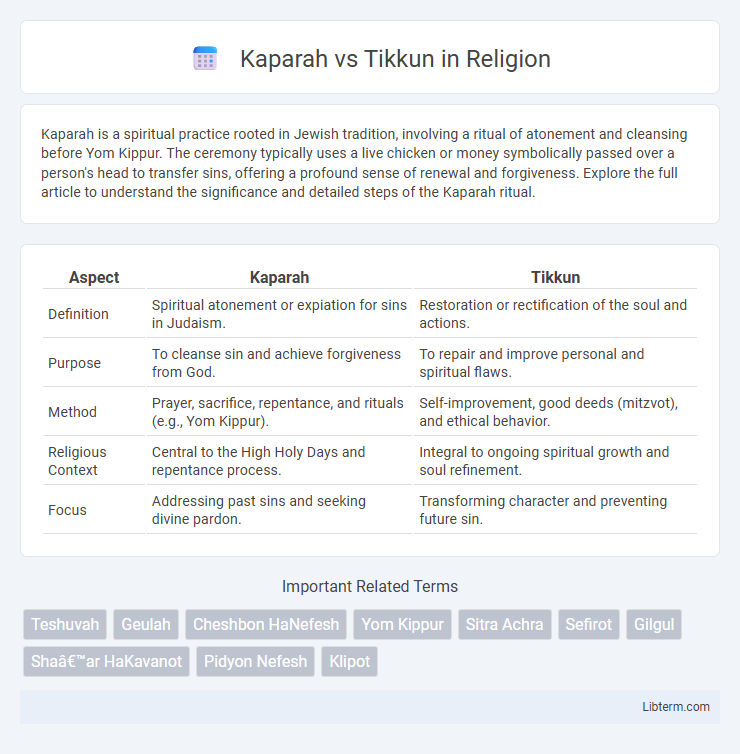Kaparah is a spiritual practice rooted in Jewish tradition, involving a ritual of atonement and cleansing before Yom Kippur. The ceremony typically uses a live chicken or money symbolically passed over a person's head to transfer sins, offering a profound sense of renewal and forgiveness. Explore the full article to understand the significance and detailed steps of the Kaparah ritual.
Table of Comparison
| Aspect | Kaparah | Tikkun |
|---|---|---|
| Definition | Spiritual atonement or expiation for sins in Judaism. | Restoration or rectification of the soul and actions. |
| Purpose | To cleanse sin and achieve forgiveness from God. | To repair and improve personal and spiritual flaws. |
| Method | Prayer, sacrifice, repentance, and rituals (e.g., Yom Kippur). | Self-improvement, good deeds (mitzvot), and ethical behavior. |
| Religious Context | Central to the High Holy Days and repentance process. | Integral to ongoing spiritual growth and soul refinement. |
| Focus | Addressing past sins and seeking divine pardon. | Transforming character and preventing future sin. |
Understanding Kaparah and Tikkun: Core Definitions
Kaparah, rooted in Jewish tradition, refers to the act of atonement and renewal to reverse sin and restore spiritual purity through rituals such as Yom Kippur sacrifices or repentance prayers. Tikkun represents the broader concept of repair and healing, both personal and cosmic, emphasizing ongoing ethical living and rectification of the world's spiritual faults (Tikkun Olam). Understanding Kaparah involves recognizing specific acts of atonement, while Tikkun encompasses continuous self-improvement and societal restoration in Jewish theology.
Historical Roots: Origins of Kaparah and Tikkun
Kaparah and Tikkun trace their origins to ancient Jewish traditions, deeply rooted in biblical and rabbinic texts emphasizing repentance and spiritual rectification. Kaparah historically emerged from practices of atonement involving sacrifices and rituals described in Leviticus, aimed at cleansing sin and restoring purity. Tikkun, evolving from Kabbalistic and mystical teachings, focuses on repairing the soul and the cosmos, highlighting a transformative process beyond mere forgiveness.
Kaparah in Jewish Tradition and Practice
Kaparah in Jewish tradition refers to the ritual of atonement performed to cleanse individuals from sins and restore spiritual purity, often practiced on Yom Kippur, the Day of Atonement. This concept emphasizes repentance, prayer, and specific rituals such as the scapegoat ceremony originally described in Leviticus 16, where sins are symbolically transferred to a goat. Kaparah serves as a foundational practice in Jewish spirituality, highlighting the importance of divine forgiveness and moral rectification.
Tikkun Explained: From Personal Repair to World Healing
Tikkun, rooted in Jewish mysticism, encompasses the concept of repair and restoration, aiming at both personal growth and universal healing. It reflects an active process where individuals engage in ethical actions, self-reflection, and spiritual practices to mend their inner flaws and contribute to the betterment of society. Unlike Kaparah, which focuses primarily on atonement for sins, Tikkun expands this notion to a holistic repair of fragmented relationships and cosmic harmony.
Key Differences Between Kaparah and Tikkun
Kaparah and Tikkun represent distinct concepts in Jewish spirituality; Kaparah refers to the process of atonement and cleansing from sin, often achieved through rituals such as the Yom Kippur fast or animal sacrifices in ancient times. Tikkun emphasizes spiritual repair, personal growth, and rectification of both individual behavior and the world, frequently linked to the mystical idea of Tikkun Olam (repairing the world). The key difference lies in Kaparah addressing immediate sin and guilt relief, whereas Tikkun focuses on long-term transformation and holistic healing.
Symbolic Rituals: How Kaparah is Observed
Kaparah is observed through symbolic rituals such as the swinging of a chicken above one's head to transfer sins, followed by the slaughtering of the animal as a purification act. This ritual embodies repentance and spiritual cleansing within Jewish tradition, contrasting Tikkun's broader focus on personal and communal rectification through study and ethical behavior. These symbolic acts in Kaparah are deeply rooted in ancient practices aimed at achieving atonement before Yom Kippur.
Tikkun in Daily Life: Individual and Communal Actions
Tikkun in daily life emphasizes proactive individual and communal actions aimed at repairing the world through acts of kindness, justice, and social responsibility. Unlike Kaparah, which centers on atonement rituals for sin, Tikkun inspires ongoing commitment to improving society and fostering spiritual growth. Practices such as charity, environmental stewardship, and community service embody Tikkun's transformative impact on both personal development and collective well-being.
Theological Perspectives: Kaparah versus Tikkun
Kaparah emphasizes atonement through ritual sacrifice or repentance to reconcile human sin with divine justice, highlighting the restoration of a broken covenant between humanity and God. Tikkun, rooted in Kabbalistic and Hasidic thought, focuses on spiritual rectification and cosmic repair, aiming to elevate and transform the soul and the world by correcting inherent spiritual flaws. Theological perspectives distinguish Kaparah as addressing individual guilt and sin, while Tikkun encompasses a holistic redemption process, integrating personal growth with universal spiritual restoration.
Contemporary Applications and Relevance
Kaparah, traditionally involving symbolic atonement through rituals like the scapegoat ceremony, remains significant in contemporary Jewish practice for personal repentance during Yom Kippur. Tikkun, emphasizing ethical rectification and social justice, has gained relevance in modern contexts by promoting community repair and global responsibility, transcending ritual boundaries. Together, they inform a holistic approach to spiritual and societal renewal, adapting ancient principles to current ethical challenges.
Choosing a Path: Integrating Kaparah and Tikkun
Choosing a path between Kaparah and Tikkun involves understanding their distinct roles in spiritual repair and rectification. Kaparah represents immediate atonement and forgiveness through specific actions or rituals, while Tikkun embodies ongoing self-improvement and soul refinement across a lifetime. Integrating Kaparah and Tikkun creates a holistic approach to spiritual growth, combining momentary cleansing with continuous transformation.
Kaparah Infographic

 libterm.com
libterm.com